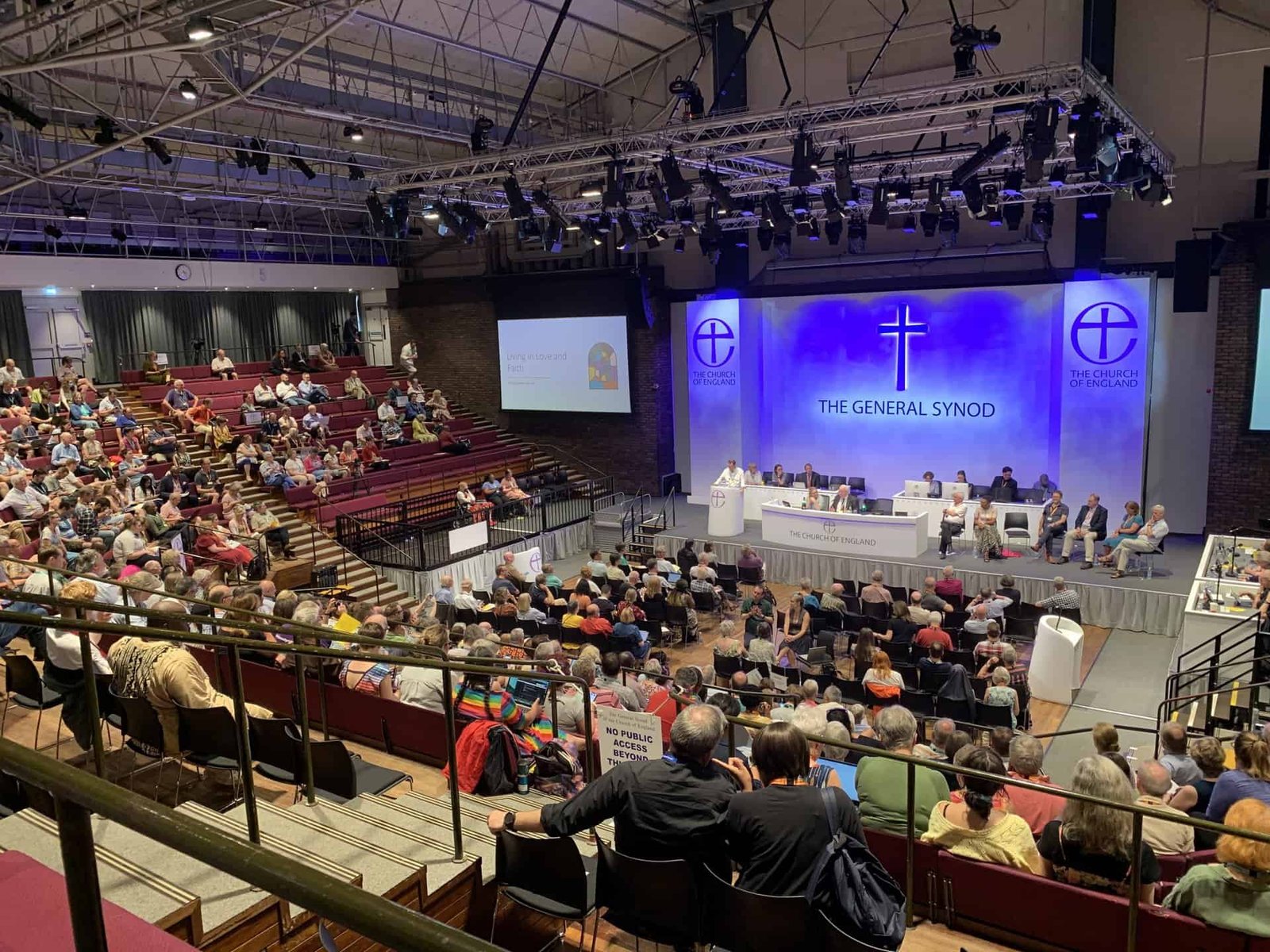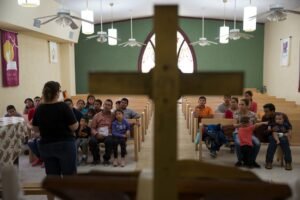By Ruth Peacock
The Church of England’s common synod — its parliament — descended into chaos this month as long-running disputes, arguments and complaints towards the archbishops of Canterbury and York exploded. It was described by certainly one of its members as probably the most fractious ever. In a Faith Media Centre briefing, we introduced collectively members of the synod and commentators to analyse what occurred and what it says in regards to the state of the CofE
The Church of England’s common synod is a law-making physique, with elected representatives, ruled by complicated guidelines and working like parliament, with motions, amendments, and voting.
Its assembly in York in July 2023 was a watershed second. Francis Martin, a Church Occasions journalist who reported all through, instructed the briefing: “Fractious is an efficient phrase to explain it. I feel there was a number of frustration as effectively that contributed to it.
“Members identified that the agenda had nearly an excessive amount of substance, however there was little or no for members to truly resolve. They had been listening to lots, they had been in a position to ask questions, however there was very restricted quantity they may really do. There have been a couple of debates nevertheless it was primarily shows.”
He mentioned the phrase typically heard was that synod was being managed, principally by the Archbishops’ Council, a physique of 20 members arrange as a separate charity, led by the 2 archbishops and a secretary-general, which has government duty for strategic pondering and scrutinising the work of nationwide church establishments. Their function was a trigger for concern.
Those that attended the five-day gathering in York, had been already deeply divided. They got here with irreconcilable divisions over same-sex marriage, and there was an outcry after two members of the Impartial Safeguarding Board — Jasvinder Sanghera and Steve Reeves — had been sacked by the Archbishops’ Council, solely two weeks earlier than synod met.
It was this that triggered the extraordinary scenes on the afternoon of Sunday 9 July. The agenda included a presentation by 4 members of the Archbishops’ Council to elucidate what occurred. They sat on the stage and browse ready feedback. However the two sacked members had been sitting within the gallery with their supporters, together with survivors, and so they disputed the details.
A number of makes an attempt had been made by synod members to offer them the precise of reply and permit them to talk. Synod was paused for 25 minutes whereas the chairwoman sought recommendation and selected a approach ahead, as bishops and synod members lobbied her and the Archbishop of York, the Most Reverend Stephen Cottrell, ran as much as the gallery to liaise with the sacked members.
They had been allowed to talk. However the lack of management, problem to authority, weight of criticism and anger on the issue in permitting somebody to deal with the synod highlighted the basic weak spot within the governance of the Church of England, in response to the Rev Marcus Walker, rector of Nice St Bartholomew within the Metropolis of London.
He instructed the briefing that the church was being run by “couch authorities”, a time period coined by critics of Tony Blair’s administration, when choices had been taken informally.
“Couch authorities exists proper on the prime of the Archbishops’ Council. There’s a complete collection of plans that it needs to get by means of, and it simply works out one of the simplest ways to do it. And naturally, the frustration is that you just don’t have the chance to problem or very often to talk towards them.”
Fr Walker instructed the briefing that the way in which wherein synod was managed had led to “the entire collapse of belief”. Synod was thought to be a risk. Formal questions had been extremely managed and infrequently there was not even a chance to problem.
He mentioned there was a curious unity throughout lots of the completely different factions, with each the progressives and traditionalists equally annoyed with the way in which wherein synod was being managed.
Frustration set in, he mentioned, when synod members knew they’d a duty however there was no mechanism to do something about it, corresponding to permitting the 2 sacked safeguarding board members to talk.
Synod member Jayne Ozanne agreed, believing there was a “cabal on the prime” and frustration that synod was unable to offer its voice. Added to this was a chaotic construction leaving a disparate understanding of authority within the church, with bishops in addition to the Archbishop’s Council. She mentioned the Council was too large, had too nice an agenda and, members —although effectively which means — weren’t consultants.
“In case you add on to that the divides within the church between the progressives and the conservatives, and the shortage of belief between these two, you’ve received an absolute strain cooker,” she mentioned.
Andrew Carey, editor of the Church of England Newspaper, who has been reporting synod for many years, mentioned: “Disputes between the church authorities and common synod have at all times been there. There have been debacles, skirmishes and atrocities alongside the way in which through the years, with studies rejected and archbishops defeated.
“However I feel there’s something about couch authorities, there’s one thing about manipulation that’s far more current.”
He feared issues may worsen in November when the bishops got here again with the wording for prayers of blessing for same-sex {couples}. He additionally hoped there can be extra respect for common synod members in debates and that they’d get up for themselves.
Professor Helen King, who’s serving on the final synod for a second time period, sees the method now as “a hideous sport”, agreeing that it had grow to be so political that it now not labored. Factions spoke to “ridiculous amendments” as a way of point-scoring to additional their trigger, and people interventions “had been one way or the other weaponised to be in regards to the prayers of affection and religion. And I don’t suppose that’s useful,” she mentioned.
Debbie Buggs, one of many volunteers to chair the synod and member of St Helen’s Bishopsgate, an evangelical church within the Metropolis of London, mentioned there was no cabal when it got here to chairing proceedings. It was a matter of judgment and a thankless process.
Her frustration with the synod course of was the urge to maneuver in the direction of choices when a considerable minority was towards, corresponding to within the vote to permit same-sex marriage blessings. She was in that minority.
“It’s nearly such as you’ve received a parliament with a very ineffective opposition,” she mentioned. Folks sharing her beliefs had been looking for correct provision, for instance having bishops who agree with them and pastoral look after individuals of their group.
She mentioned the wrangling over wording of the blessings confirmed that there was much more work to do. It was as if the bishops had been recognising “that they’ve bitten off greater than they’ll chew”.
Commentators have been making an attempt to resolve how vital this July’s synod is for the long run governance of the church. The Rev Stephen Parsons, from Surviving Church, instructed the briefing that “one thing gave”.
He mentioned the unusual voice was heard and the facility that had managed the agenda stood again. Deference to the authority of the bishops had been brazenly challenged and undermined and issues wouldn’t be fairly the identical once more. The integrity of the establishment had been challenged.
Simon Sarmiento, from the Pondering Anglicans web site, mentioned there have been questions over staffing ranges. He questioned why the fractured relationship with the Impartial Safeguarding Board members had been allowed to go on so lengthy, and what this mentioned in regards to the administration of Church Home, the CofE’s headquarters, the place long-serving employees have retired, taking with them the company reminiscence.
Clive Billenness, a member of the Archbishops’ Council’s audit committee, was fast to defend Church Home employees, saying they had been overworked and beneath strain. He thought one of many issues on the coronary heart of the disquiet was church construction, as a result of there have been 42 dioceses, every a separate charity. It was like “making an attempt to run Tesco’s with 42 regional places of work”.
Andrew Graystone, who’s an advocate for survivors of clergy abuse, mentioned the church constructions had been chaotic and this was unhealthy for safeguarding. “The mannequin of safeguarding within the Church of England doesn’t work for a variety of causes,” he mentioned. “One is as a result of the church is so disparate in its authority. It’s made up of a whole lot, in all probability hundreds of particular person charities.
“Every diocese, every cathedral, every parish church, is a charity. The Archbishops’ Council is a separate charity. And that offers deniability to each little bit of the church. Each bit can say, ‘Effectively, it’s not my duty. It’s another person’s’.”
This is a matter that has already been grasped within the 68-page Nationwide Church Governance Report and Suggestions report by Sir David Lidington, a former Conservative lord chancellor, who offered it to common synod. It referred to as for a discount within the nationwide departments to create the Church of England Nationwide Companies, which might exchange the Archbishops’ Council and combine different areas of labor.
He described the present system as a “bureaucratic tangle” and the executive tradition as “Machiavellian”.
Sir David instructed the synod: “I’ve been personally shocked by the depth of resentment and distrust that pervades organisations inside the church.”
However, we requested our briefing visitors, will organisational change be enough to show spherical the extent of mistrust towards the church hierarchy?
Andrew Graystone mentioned there was an enormous stage of distrust, an actual anger, amongst survivors. There was a necessity for extra listening, extra motion and extra openness, together with inside the Archbishops’ Council, with some displaying to him ignorance about what was occurring.
Even the announcement that Professor Alexis Jay, chair of the Impartial Investigation into Little one Abuse, had been introduced in to suggest a mannequin for totally impartial safeguarding with the Church of England, was a prime down moderately than survivor up resolution, which did nothing to “handle the acute state of affairs of victims and survivors”.
Marcus Walker wished extra openness and transparency. The extra there was open debate, the extra individuals may really be challenged with powerful questions, he mentioned. “Meaning debates the place sufficient individuals are really given sufficient time to talk and the place there’s an actual potential to attempt to tease out these questions correctly.”
Jayne Ozanne mentioned: “I feel the factor is imploding. And I feel the church must implode for one thing new and spirit-filled to maneuver ahead.” She additionally thought the UK parliament was a participant on this, quoting Sir Peter Bottomley MP saying that if the CofE didn’t kind itself out “we’ll for you”.
For the evangelical Debbie Buggs, “the silver bullet is to return to the apostolic religion as we’ve obtained it, to the Gospels, to the epistles and to return to first ideas”.
Listening to the briefing was the journalist and broadcaster Roger Bolton, who mirrored on the finish that he had a really nice disappointment on the state of the Church of England. The function of the Archbishop of Canterbury was elementary, he mentioned, and when Justin Welby’s successor was chosen, belief may solely be restored if anyone got here in who was comparatively untouched by the previous with a transparent view of what they want to obtain.
Whereas many different public establishments in Britain had been going by means of comparable ranges of mistrust, such because the BBC, the NHS and the police, “the disappointment is that all of us hope the church would do moderately higher and engender a better stage of belief than another organisations”.
The Faith Media Centre invited a variety of bishops to participate on this briefing, however none was out there.
View the briefing on our YouTube channel right here



